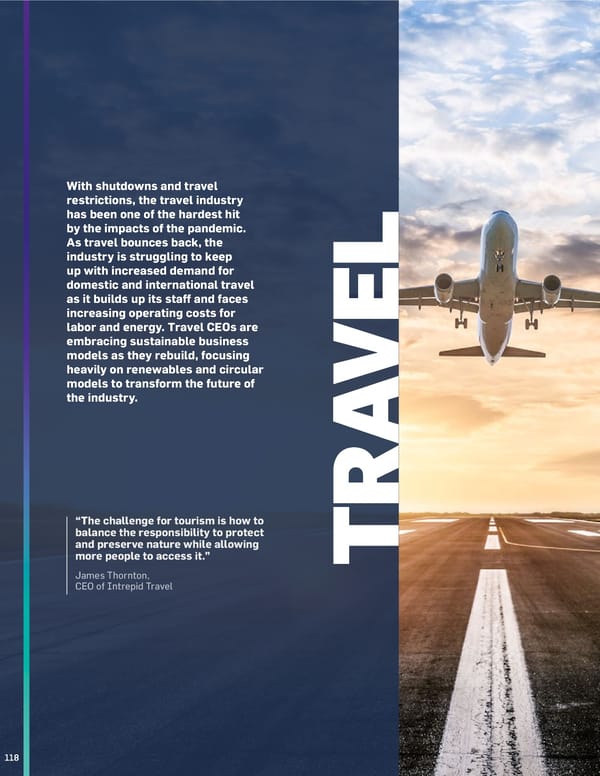T H E 1 2 T H U THE MOST PRESSING CHALLENGES TRAVEL CROSS INDUSTRY N I T E D N A 1 THREATS TO PUBLIC HEALTH 2 INFLATION & PRICE VOLATILITY 3 TALENT SCARCITY T I O N S G 37% L 12% O B 13% A L C O M 77% 69% P 57% 55% A 40% 42% C T - A With shutdowns and travel C C E restrictions, the travel industry N T U R has been one of the hardest hit E C E by the impacts of the pandemic. CURRENT LANDSCAPE O S T As travel bounces back, the U D industry is struggling to keep L TOP RESILIENCE ACTIONS FOR TRAVEL CEOS Y up with increased demand for of CEOs are of CEOs are of CEOs are digitizing engaging in upskilling or domestic and international travel 80% 74% 71% business processes long-term strategic reskilling their workforce as it builds up its staff and faces partnerships for the future labor market increasing operating costs for E labor and energy. Travel CEOs are Travel levels are returning back to pre-pandemic rates, but the nature of this travel is changing, with shorter trip durations and remote embracing sustainable business working blurring the lines between leisure and business trips. Travel companies are looking to staff up to meet this demand; however, models as they rebuild, focusing CEOs are facing extreme talent shortages, causing operational issues and straining trust with customers. To help address staffing shortages, CEOs are turning to digital tools, such as contactless check-in and artificial intelligence-powered customer service. To survive heavily on renewables and circular during the early days of the pandemic, many travel companies put their sustainability investments on pause. Now, sustainability efforts models to transform the future of are picking back up and being leveraged to help de-risk supply chains and secure energy costs. With a growing trend for sustainable travel among customers, travel CEOs are looking into close partnerships with local communities to support them as they recover from the industry. pandemic impacts, as well as provide unique experiences for travelers. AV WHERE IS THE INDUSTRY GOING? TOP SUSTAINABILITY PRIORITIES FOR TRAVEL CEOS of CEOs are of CEOs are of CEOs are lowering investing in constructing 56% 55% 55% R GHG emissions skills development a responsible supply chain “The challenge for tourism is how to Sustainability is a key challenge and top priority for the future of travel as travel companies are already experiencing the physical risks balance the responsibility to protect of climate change with increasing frequency. Hospitality CEOs are most focused on addressing the physical impacts of climate change, and preserve nature while allowing while those in transportation are more focused on decarbonizing. Hospitality companies are looking at circular business models to incorporate waste management frameworks and bio-based products into their offerings. Transportation CEOs are exploring innovative more people to access it.” T paths to decarbonize, such as embracing renewable energy and investing in sustainable aviation fuel. The travel industry’s appetite for green solutions is there, yet significant investment in infrastructure and economic incentives are needed to achieve widespread adoption. James Thornton, CEO of Intrepid Travel TRANSFORMATIVE INNOVATIONS Renewable energy 83% Circular business models 74% Sustainable aviation fuel 63% Alternative propulsion 62% 2 Biometrics to facilitate contactless interactions 3 % HIGH IMPACT MODERATE IMPACT LOW IMPACT NO IMPACT 118 119
 Accenture CEO Study United Nations Global Compact Page 117 Page 119
Accenture CEO Study United Nations Global Compact Page 117 Page 119